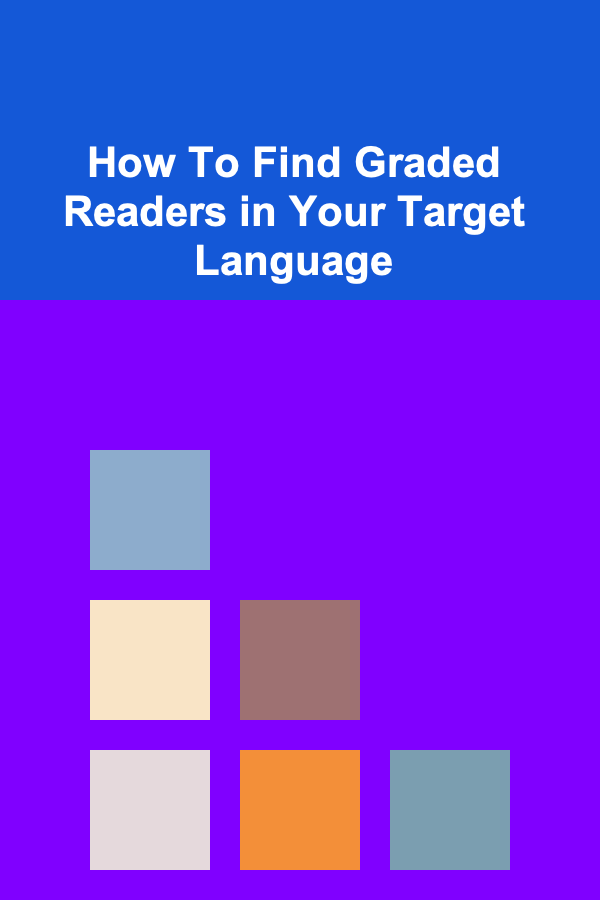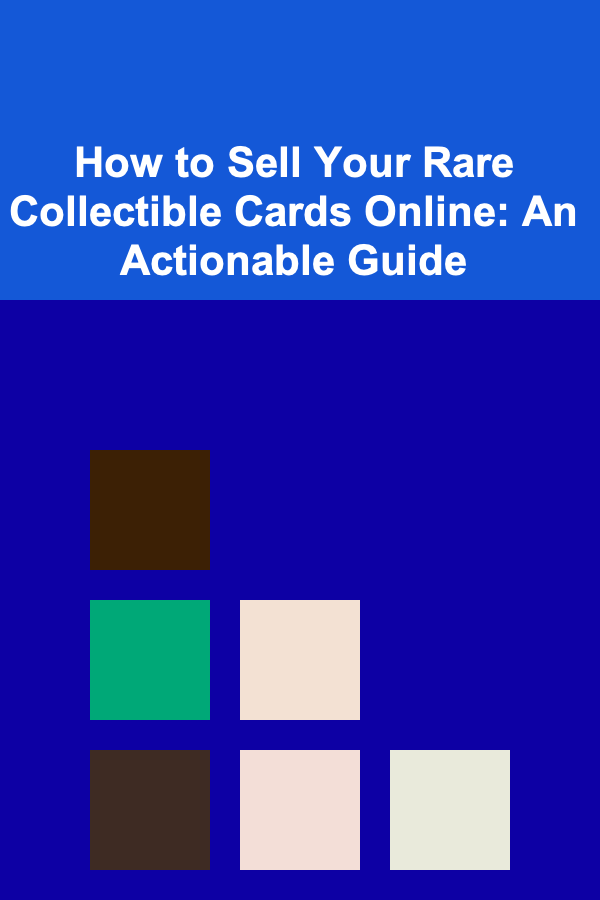
How To Find Graded Readers in Your Target Language
ebook include PDF & Audio bundle (Micro Guide)
$12.99$8.99
Limited Time Offer! Order within the next:

Language learning is an exciting and transformative journey that allows you to open doors to new cultures, opportunities, and perspectives. One of the most effective methods to improve your language skills is reading, but when you're a beginner or at an intermediate level, reading can feel like a daunting task. This is where graded readers come in---carefully crafted books designed to suit the language proficiency of learners. In this article, we will explore how to find graded readers in your target language and why they are such a useful tool in language acquisition.
What Are Graded Readers?
Graded readers, also known as simplified readers, are books that are specifically tailored to language learners at different stages of proficiency. These books are divided into levels, with each level reflecting the learner's language ability. They contain controlled vocabulary, simpler sentence structures, and other modifications that make them more accessible to learners than standard books written for native speakers.
The key benefits of graded readers include:
- Building Confidence: They allow learners to gradually build their reading comprehension without feeling overwhelmed.
- Vocabulary Acquisition: Graded readers introduce new vocabulary in context, making it easier to remember and use.
- Improved Fluency: Regular reading helps learners become more comfortable with the language, improving both reading and speaking fluency.
- Cultural Exposure: Many graded readers incorporate aspects of the culture tied to the language, giving learners a richer context for their learning.
Now that we know the basics of graded readers, let's look at how you can find them for your target language.
Language Learning Platforms and Apps
In the digital age, there are several language learning platforms that offer graded readers as part of their resources. These platforms often provide reading materials in a wide range of languages, complete with levels suited for beginners to advanced learners.
Duolingo
Duolingo is one of the most popular language learning apps worldwide, and while it primarily focuses on vocabulary and grammar exercises, it also offers a range of reading materials. They are not strictly "graded readers" in the traditional sense but are simplified enough to suit learners at different levels.
LingQ
LingQ is another great platform for language learners. It allows you to read books, articles, and other content in your target language while providing tools for learning vocabulary and improving comprehension. LingQ offers a wide range of graded reading materials, including ebooks and audiobooks. Their library is available in many languages, and you can filter content by difficulty.
Readlang
Readlang is a digital tool that enables learners to read texts in their target language with the help of built-in dictionaries and word tracking. It's especially useful for learners who want to read authentic materials (like articles, books, and websites) but need help with vocabulary. While Readlang doesn't have a specific graded reader collection, you can use it to read simpler texts at your level.
Graded Reader Publishers
Several publishers specialize in graded readers and have a large selection of books in various languages. These publishers often have different levels of difficulty, from beginner to advanced, and they use language that is appropriate for the learner's proficiency level.
Penguin Readers
Penguin Readers is one of the most well-known publishers of graded readers. Their collection includes well-known classics, contemporary novels, and even adaptations of movies and TV shows. The books are divided into levels, so learners can progress gradually as they improve their language skills.
Oxford Bookworms Library
Oxford Bookworms Library offers a range of graded readers for learners of all levels. They have books in various genres, including fiction, non-fiction, and even science fiction. Each book comes with a glossary of difficult words and comprehension questions at the end of the book to help reinforce learning.
Cambridge English Readers
Cambridge University Press also offers a series of graded readers under the "Cambridge English Readers" brand. Their books are designed for students who are learning English as a second language but are equally useful for other languages as well. Cambridge English Readers are available in multiple genres and can be found at different difficulty levels.
Collins Easy Learning Readers
Collins, another reputable publisher, offers an array of graded readers that are particularly useful for beginner to intermediate learners. Their books cover a range of topics, including popular culture, history, and travel, and they provide learners with vocabulary lists and exercises to reinforce learning.
Libraries and Bookstores
While online platforms are a great way to find graded readers, you should not overlook your local library or bookstore. Many public libraries offer collections of graded readers, especially in larger cities where there is a demand for language learning resources. Bookstores that specialize in language learning materials often carry graded readers as well.
Local Libraries
If you live in a city with a large international community or have access to a university library, you may be able to find graded readers in your target language. Libraries often carry language learning books, including graded readers, as they are in high demand. It is worth asking a librarian if they can help you locate these materials or request them through inter-library loans.
Online Bookstores
Major online bookstores like Amazon or Book Depository have a wide selection of graded readers. You can easily search for books in your target language by using filters that allow you to narrow down the results based on genre, author, and level of difficulty.
Additionally, online marketplaces often have a variety of formats, including physical books, ebooks, and audiobooks, so you can choose the one that suits your learning preferences.
Language Exchange Groups and Communities
One of the most rewarding ways to find graded readers is by connecting with other language learners and native speakers. Language exchange communities---whether online or in person---can provide valuable resources and recommendations for reading materials. These groups often share and exchange graded readers or can point you toward resources you might not have otherwise encountered.
Language Exchange Websites
Websites like Tandem , HelloTalk , and Speaky are great places to meet other language learners or native speakers of your target language. These platforms often host language exchange groups or forums where you can ask for recommendations on graded readers or share your own resources with others.
Social Media and Forums
Social media platforms like Reddit, Facebook, and Twitter also have dedicated language learning communities. Subreddits like r/languagelearning and r/fluency can be helpful resources where you can ask for advice and recommendations on graded readers. Language learning groups on Facebook and other social networks can also provide guidance and help you discover new books and resources.
Free Online Resources and Websites
For those on a budget, there are plenty of free online resources where you can find graded readers for language learning. These websites may offer downloadable ebooks, websites for reading practice, or collections of open-source content that can be used for language acquisition.
Project Gutenberg
Project Gutenberg offers thousands of free public domain books, many of which have been simplified or adapted for language learners. While Project Gutenberg does not specialize in graded readers, you can find classic literature in many languages that has been made more accessible for learners.
Language-Specific Websites
There are also websites dedicated to particular languages that provide graded readers and other resources. For example, websites like Digital Dialects offer free interactive games, and websites such as News in Slow Spanish or News in Slow French provide simplified news articles for learners of those languages.
Open Educational Resources (OER)
Open Educational Resources are free, openly licensed educational materials that can be used for language learning. Websites like OER Commons offer a range of reading resources that can help learners find graded texts and exercises tailored to their proficiency levels.
Apps and Audiobooks
If you prefer a more interactive or auditory approach, there are plenty of apps and audiobook services that cater to language learners. Many of these platforms include graded readers and other learning materials.
Audible
Audible offers a large collection of audiobooks, including those tailored to language learners. Audiobooks in your target language can be a great way to improve your listening skills while simultaneously increasing your vocabulary.
Book Creator
Book Creator is a flexible app that allows learners to create and share their own books. Some learners use it to create their own graded readers by simplifying content from other sources.
Read Aloud Apps
There are apps designed to read books aloud to you, such as Speechify and Natural Reader. These can help with comprehension when paired with graded readers, especially for beginners who may need additional support with pronunciation and listening.
Conclusion
Finding graded readers in your target language can be a highly rewarding experience for language learners. Whether you're using digital tools, searching through libraries, or exploring language exchange groups, there are countless ways to access these valuable resources. By incorporating graded readers into your learning routine, you will not only improve your reading skills but also boost your overall language proficiency.
The journey to fluency is one of consistency and gradual progress. As you read, learn, and immerse yourself in the language, you will begin to notice improvements in your comprehension, vocabulary, and confidence. The more you read, the more you unlock the world of your target language---so take the plunge and start exploring today!

How to Add a Personal Touch to Your Holiday Decor with Custom Items
Read More
How to Make the Most of Small Spaces with Holiday Decorations
Read More
How to Sell Your Rare Collectible Cards Online: An Actionable Guide
Read More
How to Set Up a DIY Family Bowling Alley in Your Garage
Read More
How to Create a System for Knowledge Management
Read More
How to Navigate Insurance and Pre-Authorization for Doctor Appointments
Read MoreOther Products

How to Add a Personal Touch to Your Holiday Decor with Custom Items
Read More
How to Make the Most of Small Spaces with Holiday Decorations
Read More
How to Sell Your Rare Collectible Cards Online: An Actionable Guide
Read More
How to Set Up a DIY Family Bowling Alley in Your Garage
Read More
How to Create a System for Knowledge Management
Read More